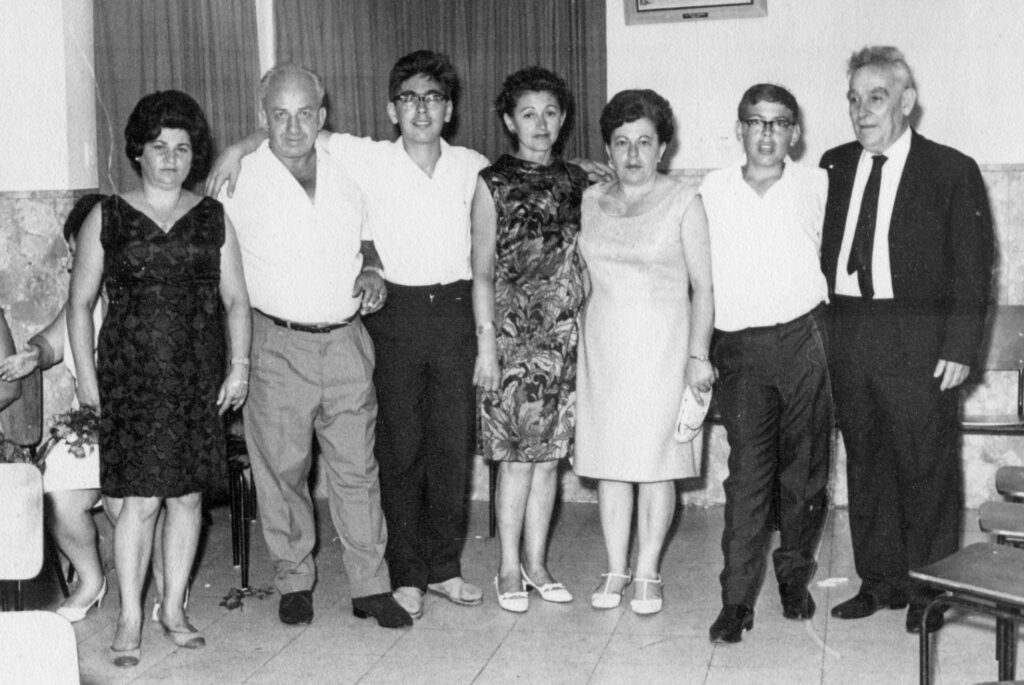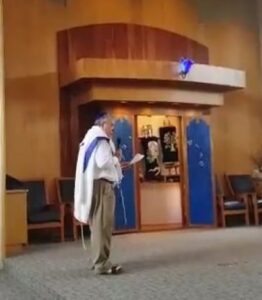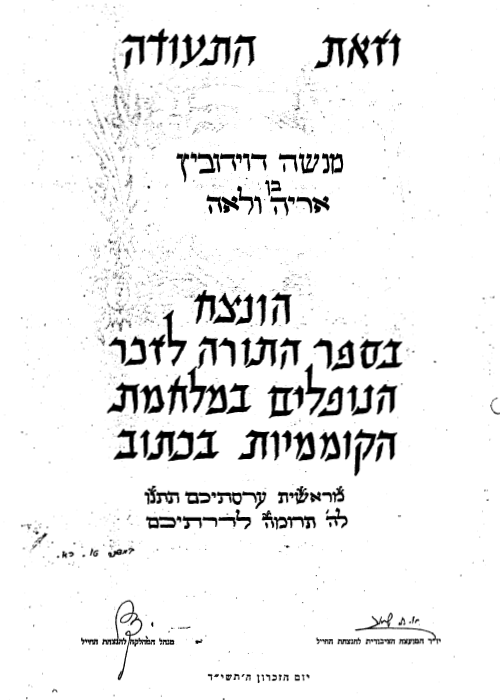Bar Mitzvah
The Bar Mitzvah (for boys, Bat Mitzvah for girls) is a celebration of rite of passage. Jewish youth receive then privileges and assume responsibilities to perform Mitzvot (commandments) and become active members of the Jewish community. This celebration takes place during a Shabbat morning service. The Bar/Bat Mitzvah groom/bride will be called up to the Torah for the first time in their lives. In addition to making the required blessings for the Aliyah (Ascend to Torah) they will read from Torah. They are also expected to talk about the Parashah and what is their own personal take away from it.
Mine happened after I turned 13 according to the Hebrew Calendar (a week after my Gregorian Calendar birth date). I chanted Parashat Shlach Lecha in its entirety, honoring my male family members that came up to Torah and probably said few words. Honestly speaking, I do not remember almost any of it; in fact, it wasn’t inspiring me at all.

The Jubilee (50th anniversary) of my Bar-Mitzva was very special. It happened the Shabbat before my ordination as a Rabbi. This time it was most meaningful and inspiring for me, for our friends and the congregation. The first to chant from Torah was my beloved soulmate, Connie, Neshama (her Hebrew Name). It was the first time ever she chanted a Torah portion. In a sense it was also her own ‘Bat-Mitzvah’, thus multiplying the celebration!
I highly recommend you to celebrate a jubilee of your Bar/ Bat-Mitzvah. It is such a meaningful and inspiring event that will uplift yours and your loved ones’ souls to unimaginable heights.

Shlach Lecha – Send Forth for You the Spies.
The Parashah starts with naming the twelve delegates, one from each Tribe, that would go and scout Canaan. The twelve indeed fulfilled their assignment and came back to report their finding. They brought pomegranates, figs and a huge cluster of grapes that attested to the luscious fruit of the land:
it does indeed flow with milk and honey, and this is its fruit.
.וְגַם זָבַת חָלָב וּדְבַשׁ הִוא וְזֶה פִּרְיָהּ׃
But then they divert from their charter as information providers. Ten of them add a bleak assessment, saying with fear (ibid, verses 31-32): “We cannot attack that people, for it is stronger than we. The country that we traversed and scouted is one that devours its settlers. All the people that we saw in it are of great size; we saw the hero giants [Nephilim], the descendants of giants [Anak] and we felt ourselves like grasshoppers , and so they must have perceived us.”
Two of the members of the delegation object and an argument ensues.
Let us ascend, go up [make Aliya], and inherit [gain possession of] it, for we can and shall overcome it.”
“Why is HaShem taking us to that land to fall by the sword? Our wives and children will be carried off [into slavery]! It would be better for us to go back to Egypt!” cried out the ten other chieftains, with the People echoing their words: “Let us appoint a leader and return to Egypt!” (ibid 14:3-4).
The Two argued, claiming (ibid 14:7-9): ““The land that we traversed and scouted is an exceedingly good land. If pleased with us, HaShem will bring us into that land and give it to us, a land that flows with milk and honey. Only you must not rebel against HaShem! Have no fear of the people of the country, for they are our prey as easy as bread; their protection has departed from them, and HaShem is with us, have no fear of them!”
It is All About Names
Names in Shlach Lecha
Our sages in Talmud (Sotah 34b) remembered that it was ‘a tradition of ours that was passed down to us from our ancestors: The spies were named after their actions’. They explained how the names ‘Sethur son of Michael’ and ‘Nahbi son of Vophsi’ indicated their rebellious actions.
Hoshea son of Nun from the Tribe of Ephrayim was one of the delegates that was in favor of pursuing the possession of Canaan. The name Hoshea comes from the root of save, redeem. However, Moshe changed Hoshea’s name to Yehoshua [Joshua] (ibid 13:16):
Moshe changed the name of “Hoshea.” son of Nun to Yehoshua [Joshua].
וַיִּקְרָ֥א מֹשֶׁ֛ה לְהוֹשֵׁ֥עַ בִּן־נ֖וּן יְהוֹשֻֽׁעַ׃
Rashi commented on this verse while referring to the same abovementioned Talmudic source. Yehoshua is a compound of Yah and Hoshea and means ‘God will save’. Moshe, by giving him this name, prayed for Hoshea: “May God save you from the evil counsel of the spies.”
The other spy that opposed the majority opinion is Kalev son of Yefuneh from the Tribe of Judah. Kalev in Hebrew may mean ‘like a heart’ or ‘all heart’, a compound of two words: Kol and Lev. Rabbi Ḥizkiyah son of Manoaḥ (Chizkuni) asserted that Kalev’s father was Ḥetzron, Yehudah’s grandson (Genesis 46:12, I Chronicles 2). The root of this name means turned aside, or turned away; Kalev turned away from all the nay sayers. Rashi (in his comment to verse 22) said that Kalev had the change of heart after he visited Ḥevron. There he prayed at the grave of The Patriarchs for strength to withstand the pressure of the majority.
One of the Torah readers in my Bar-Mitzvah Jubilee was my friend Kalev, a person who is all heart. His request to chant an Aliya touched and moved me deeply. Thank you, Kalev, from the bottom of my heart.
The other Torah reader was my soulmate and partner in life, Connie. Her Hebrew name is נְשָׁמָה – Neshama, meaning soul.
The Neshama, the soul, of man is the lamp of the LORD.
נֵ֣ר יְ֭הוָה נִשְׁמַ֣ת אָדָ֑ם
Rabbeinu Bahiyah comments on Proverbs 20:27: “The soul of Man may be considered like a shining light supplied by God. The Neshama was breathed into the Human Being by the mouth of the Supreme God personally (Genesis 2:7). The soul is distinct from the body and not an ‘alloy’ of four elements but is one single ‘component’. That, in and by itself, already predisposes it for eternal life.”
Most of the names in Hebrew have meanings. So many times, the name parents give to their child reflects the character of that child in the future. According to Kabbala the Soul choses the name and, in a miraculous way, it conveys the it to the parents. The Hebrew word for name – Shem (שֵׁם) share the same letters as Neshama. A person’s name reflects one’s Neshama and just as the Neshama is, the name is also eternal.
Not for null did King Solomon say in Ecclesiastes 7:1:
A good name is better than precious ointment
טוֹב שֵׁם מִשֶּׁמֶן טוֹב
Kohelet Rabbah, the Midrashic commentary on Ecclesiastes, elaborates on this verse: “Good oil is good for its time, good name is good for eternity. Good oil expires, good name never expires. Obtaining good oil costs lot of money, good name comes free of charge. Good oil is used during one’s life, good name is used during one’s life and after his death.”
About My Own Name
My own name, Emanuel, עִמָנוּאֵל, has in fact two meanings. The first is the obvious, that most of you know, God is with us: Imanu – עִמָנוּ – with us, El – אֵל – God.
The second meaning stems from our family history and my two fallen brothers, Eliezer and Menashe. I told how they influenced my life in a separate posting, that I hope would be interesting to read. Eliezer (God helper, or God is helping) was also the name of Moshe’s son. In my teaching about Parashat Yitro I elaborated about the tradition of dedicating a verse in Torah to a name of a loved one. Menashe was also the name of Joseph’s first-born son – meaning (Genesis 41:51): “God has made me forget completely my hardship and my parental home.”
Rearranging the letters that make up Mensashe (מְנָשֶׁה) make up the word Neshama (נְשָׁמָה). Here you have another personal connection to the Parasha…
Take the first letters of Menashe, Mem and Nun, and add to them the letter Vav (and in Hebrew). Now add the first letters of Eliezer – Alef and Lamed. The result is מָנוּאֵל – MANUEL, the acronym for Menashe and Eliezer. The letter Ayin (ע), with its value of 70, has mystical and biblical significance. The 70 sages Moshe assembled to help him Parashat B’Haalotech and the number of sages that created the Septuagint (the Bible translation to Greek, 2nd century BCE) are a few examples. Putting the Ayin in front of the MANUEL completes my name – Emanuel – עִמָנוּאֵל. This is the reason why I refuse to shorten my name into a nickname.
My choice of Aliyah reading
I chose to read Numbers 15:17-21 in the Parasha with focus and intent on the last verse:
You shall make a gift to the LORD from the first yield of your baking, throughout the ages.
מֵרֵאשִׁית֙ עֲרִסֹ֣תֵיכֶ֔ם תִּתְּנ֥וּ לַיהוָ֖ה תְּרוּמָ֑ה לְדֹרֹ֖תֵיכֶֽם׃
You may wonder why, since this verse doesn’t relate to any of the main stories of the Parasha. So here is the personal connection.
About a year before the Bar-Mitzvah jubilee, I visited with my sister Yona the Palmaḥ museum in Tel-Aviv. In their archive there was a drawer with Menashe’s name on it. There we found a certificate, attesting that the Ministry of Defense dedicated a Torah in honor of the fallen in the independence war. In that Torah Scroll, each verse was dedicated to one of the over 6,500 of the fallen in the Independence War. The Torah was completed in 1954, a year before I was born. As you can see, verse15:21 was dedicated to the memory of Menashe. Chanting this verse in my Bar-Mitzvah jubilee closes the circle for me with a deep, unbreakable tie.
